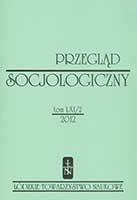Zaangażowanie religijne a stan zdrowia osób w wieku podeszłym: mechanizmy zależności, wybrane wyniki badań
Religious involvement and health status in older people: mechanisms of interaction, selected results
Author(s): Barbara WoźniakSubject(s): Social Sciences
Published by: Łódzkie Towarzystwo Naukowe
Keywords: older people; religiosity; health; quality of life
Summary/Abstract: According to theory and research conducted within sociology and psychology of religion, religious involvement may reduce psychological distress and increase health status and psychological well-being in several ways, e.g. by generating high levels of social resources, including social integration and social support, by shaping behavioral patterns and lifestyles in ways that reduce the risk of major chronic and acute stressors and by providing specific cognitive resources that are useful in the problem-solving or coping with stressors (Ellison 1994). Religion plays an especially important role in later life because religious involvement helps older people to face impending death, to find and maintain a sense of meaningfulness and significance in life, to accept the inevitable loses of old age and to discover and utilize the compensatory values that are potential of old age (Barron 1961). The aim of the study was to verify hypothesis on the relationship between religiosity and health in older age. Conducted analyses revealed that religious involvement is a significant predictor of mental health in older age. Religious provision of meaning is probably the most important causal mechanism associated with this relationship.
Journal: Przegląd Socjologiczny
- Issue Year: 61/2012
- Issue No: 2
- Page Range: 207-242
- Page Count: 36
- Language: Polish

